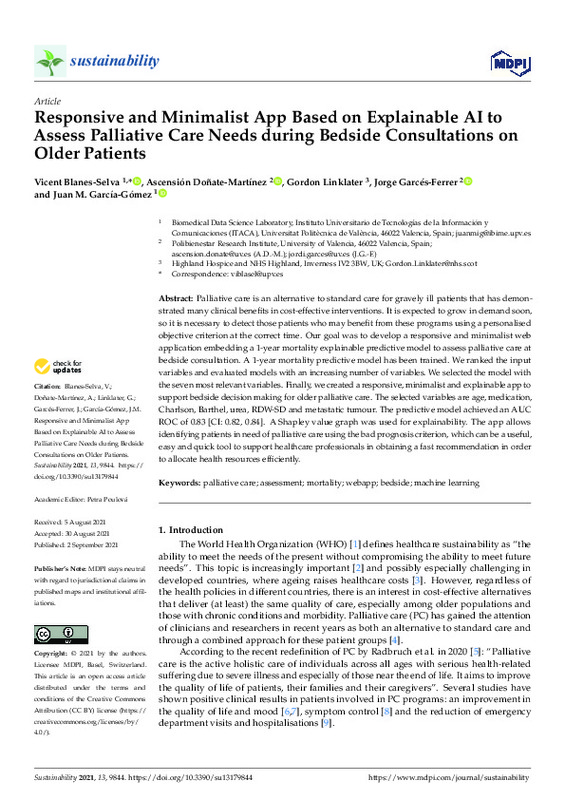JavaScript is disabled for your browser. Some features of this site may not work without it.
Buscar en RiuNet
Listar
Mi cuenta
Estadísticas
Ayuda RiuNet
Admin. UPV
Responsive and Minimalist App Based on Explainable AI to Assess Palliative Care Needs during Bedside Consultations on Older Patients
Mostrar el registro sencillo del ítem
Ficheros en el ítem
| dc.contributor.author | Blanes-Selva, Vicent
|
es_ES |
| dc.contributor.author | Doñate-Martínez, Ascensión
|
es_ES |
| dc.contributor.author | Linklater, Gordon
|
es_ES |
| dc.contributor.author | Garcés-Ferrer, Jorge
|
es_ES |
| dc.contributor.author | Garcia-Gomez, Juan M
|
es_ES |
| dc.date.accessioned | 2022-05-11T18:06:29Z | |
| dc.date.available | 2022-05-11T18:06:29Z | |
| dc.date.issued | 2021-09 | es_ES |
| dc.identifier.uri | http://hdl.handle.net/10251/182549 | |
| dc.description.abstract | [EN] Palliative care is an alternative to standard care for gravely ill patients that has demonstrated many clinical benefits in cost-effective interventions. It is expected to grow in demand soon, so it is necessary to detect those patients who may benefit from these programs using a personalised objective criterion at the correct time. Our goal was to develop a responsive and minimalist web application embedding a 1-year mortality explainable predictive model to assess palliative care at bedside consultation. A 1-year mortality predictive model has been trained. We ranked the input variables and evaluated models with an increasing number of variables. We selected the model with the seven most relevant variables. Finally, we created a responsive, minimalist and explainable app to support bedside decision making for older palliative care. The selected variables are age, medication, Charlson, Barthel, urea, RDW-SD and metastatic tumour. The predictive model achieved an AUC ROC of 0.83 [CI: 0.82, 0.84]. A Shapley value graph was used for explainability. The app allows identifying patients in need of palliative care using the bad prognosis criterion, which can be a useful, easy and quick tool to support healthcare professionals in obtaining a fast recommendation in order to allocate health resources efficiently. | es_ES |
| dc.description.sponsorship | This work was supported by the InAdvance project (H2020-SC1-BHC-2018-2020 grant agreement number 825750.) and the CANCERLEss project (H2020-SC1-2020-Single-Stage-RTD grant agreement number 965351), both funded by the European Union's Horizon 2020 research and innovation programme. | es_ES |
| dc.language | Inglés | es_ES |
| dc.publisher | MDPI AG | es_ES |
| dc.relation.ispartof | Sustainability | es_ES |
| dc.rights | Reconocimiento (by) | es_ES |
| dc.subject | Palliative care | es_ES |
| dc.subject | Assessment | es_ES |
| dc.subject | Mortality | es_ES |
| dc.subject | Webapp | es_ES |
| dc.subject | Bedside | es_ES |
| dc.subject | Machine learning | es_ES |
| dc.subject.classification | FISICA APLICADA | es_ES |
| dc.title | Responsive and Minimalist App Based on Explainable AI to Assess Palliative Care Needs during Bedside Consultations on Older Patients | es_ES |
| dc.type | Artículo | es_ES |
| dc.identifier.doi | 10.3390/su13179844 | es_ES |
| dc.relation.projectID | info:eu-repo/grantAgreement/EC/H2020/825750/EU | es_ES |
| dc.relation.projectID | info:eu-repo/grantAgreement/EC/H2020/965351/EU | es_ES |
| dc.rights.accessRights | Abierto | es_ES |
| dc.contributor.affiliation | Universitat Politècnica de València. Departamento de Física Aplicada - Departament de Física Aplicada | es_ES |
| dc.description.bibliographicCitation | Blanes-Selva, V.; Doñate-Martínez, A.; Linklater, G.; Garcés-Ferrer, J.; Garcia-Gomez, JM. (2021). Responsive and Minimalist App Based on Explainable AI to Assess Palliative Care Needs during Bedside Consultations on Older Patients. Sustainability. 13(17):1-11. https://doi.org/10.3390/su13179844 | es_ES |
| dc.description.accrualMethod | S | es_ES |
| dc.relation.publisherversion | https://doi.org/10.3390/su13179844 | es_ES |
| dc.description.upvformatpinicio | 1 | es_ES |
| dc.description.upvformatpfin | 11 | es_ES |
| dc.type.version | info:eu-repo/semantics/publishedVersion | es_ES |
| dc.description.volume | 13 | es_ES |
| dc.description.issue | 17 | es_ES |
| dc.identifier.eissn | 2071-1050 | es_ES |
| dc.relation.pasarela | S\445554 | es_ES |
| dc.contributor.funder | European Commission | es_ES |








